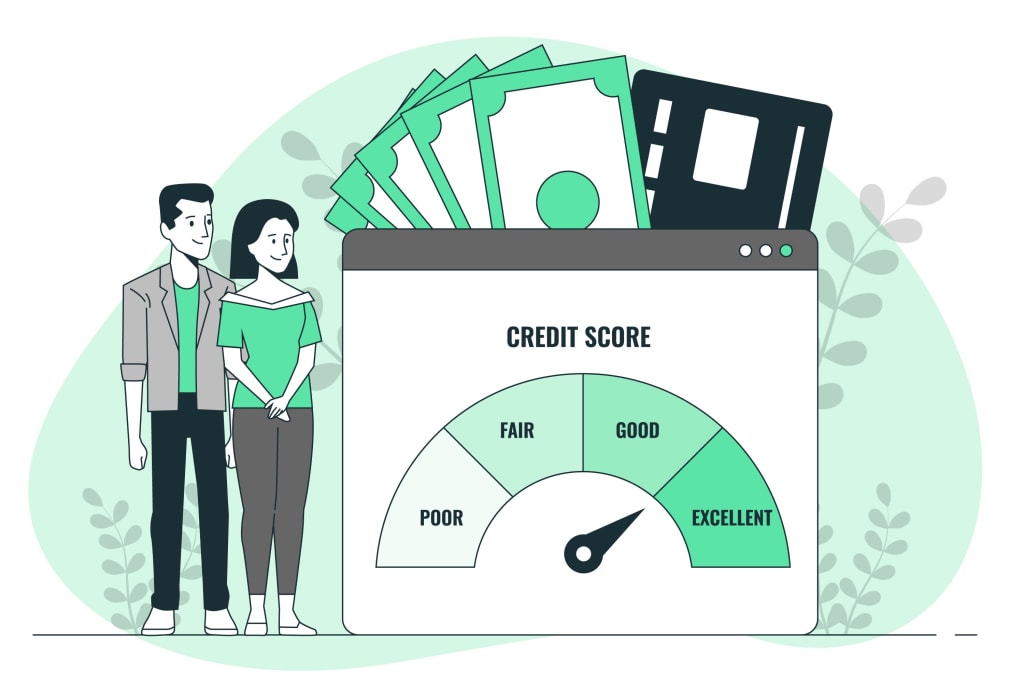The Path to Financial Freedom: A Comprehensive Guide to Raising Your Credit Score
Master the Art of Credit Score Improvement: Practical Advice for a Better Financial Future

Having a decent credit score is more crucial than ever in the financial world of today. Lenders, banks, and other financial institutions use your credit score, a numerical representation of your creditworthiness, to assess your suitability for credit and your capacity to repay loans. You can have trouble getting a loan, a mortgage, or even a credit card if your credit score is low.
This blog post will go through how to raise your credit score and why it's important. We'll also give you examples, website references, and data from real-world situations to assist you to appreciate the value of having a good credit score.
Knowledge About Your Credit Score
It's critical to comprehend what a credit score is and how it's determined before learning how to raise it. Your payment history, credit utilization, length of credit history, categories of credit, and most recent credit queries are all taken into account when calculating your three-digit credit score.
The FICO score, which ranges from 300 to 850, is the most often utilized credit score. In general, a credit score of 700 or above is regarded as good, while a score of 800 or more is regarded as exceptional.
The Importance of Your Credit Score
When establishing your creditworthiness and capacity to receive credit, your credit score is crucial. Here are some explanations for why a high credit score is important:
1. Faster loan approval: If you have a high credit score, you have a better chance of getting approved for credit cards, loans, and mortgages.
2. Reduced interest rates: Having a high credit score can help you secure credit cards and loans with lower interest rates, which over time might save you thousands of dollars in interest payments.
3. Lower insurance rates: Your credit score may also have an impact on the insurance premiums you pay, including those for life, house, and vehicle policies.
4. More job opportunities: Especially if you will be handling finances in your role, employers may check your credit score as part of the hiring process.
5. Greater negotiating power: You may have more negotiating power when negotiating interest rates and terms for loans and credit cards if you have a high credit score.
How to Boost Your Credit Score
Now that you are aware of how crucial having a high credit score is, let's talk about how you can raise it. Here are a few advices:
6. Verify your credit history
Checking your credit report is the first step to raising your credit score. Your credit report, which contains details on your payment history, unpaid bills, and credit inquiries, is a record of your credit history. Once a year, you are entitled to a free copy of your credit report from each of the three major credit reporting agencies: Experian, Equifax, and TransUnion. The benefit of reviewing your credit report is that you might see any inaccuracies that can be harming your credit score.
You can check your credit report on the following websites:
• AnnualCreditReport.com: The federal government has granted permission for this website to offer free credit reports from each of the three main credit agencies.
• Credit Karma: Credit Karma provides free TransUnion and Equifax credit reports and scores. They also offer credit monitoring and tailored advice to assist you in building your credit.
• MyFICO: MyFICO is a for-profit service that offers credit reports and scores from each of the three main credit reporting agencies. Moreover, they provide identity theft protection and credit monitoring.
7. Remit your payments on time
One of the most important criteria that determine your credit score is your payment history. Your credit score may suffer as a result of missed payments, collections, and bankruptcies. Make sure to pay your payments on time each month if you want to raise your credit score. Set up recurring reminders or automated payments to keep you on track.
Websites that can assist you in making on-time bill payments include:
• Mint: Mint is a no-cost budgeting tool that can be used to keep track of your payments and set up alerts for when they are due.
• Prism: You may pay all of your bills at once with this free software. To help you remember to pay your bills on time, you can set up automatic payments or reminders.
• Bill.com: Bill.com is a paid service that enables you to manage your accounts payable, set up automatic payments, and pay invoices online.
8. Lower your debt
Your credit score may be impacted negatively by high debt levels. Work on reducing your debt if you want to raise your credit score. Consider merging your debt into a single loan with a reduced interest rate after paying off your highest interest debts first.
Websites that can assist you with debt relief include:
• NerdWallet: NerdWallet has a debt calculator that will assist you in coming up with a debt repayment strategy. They also offer details on credit cards with balance transfers and debt restructuring.
• Credit Sesame: Credit Sesame offers individualized debt-reduction solutions. To assist you in tracking your progress, they also provide a debt tracker.
• Debt.org: This website offers information and tools, such as debt consolidation, debt management programs, and debt settlement, to assist you in managing your debt.
9. Make prudent use of credit
When using credit responsibly, you avoid running up the limit on your cards, avoid making a lot of loan or credit card applications, and maintain a low credit utilization ratio. Your credit usage ratio measures how much credit you have available relative to how much credit you are currently utilizing. Your credit score can rise if your credit use rate stays below 30%.
Among the websites that can guide you in using credit wisely are:
• Credit Karma: Credit Karma offers a credit usage calculator to assist you figure out your utilization ratio in addition to offering free credit reports and scores. Also, they offer suggestions for credit cards that can raise your credit utilization.
• WalletHub: You can view how various actions, such as getting a new credit card or paying off a loan, can affect your credit score using WalletHub's credit score simulator. Also, they offer tailored loan and credit card advice.
• Experian: Experian provides a credit utilization tracker that enables you to track the evolution of your credit utilization ratio. Also, they offer suggestions for credit cards that can raise your credit utilization.
10. Take into account a secured credit card
Receiving approval for a credit card can be difficult if your credit score is low. A secured credit card, however, can be a great way to establish or repair your credit. A security deposit is needed for a secured credit card, and that amount serves as your credit limit. Your payment history will be recorded to the credit bureaus, and you can use the card just like a conventional credit card.
You can find a secured credit card on the following websites:
• Bankrate: Bankrate has a secured credit card comparison tool that lets you look at features and costs.
• NerdWallet: Based on your credit score, NerdWallet recommends the best secured credit cards.
• CreditCards.com: This website provides a secured credit card finding tool that enables you to look for cards depending on your credit score and other factors.
In conclusion, raising your credit score requires time and effort, but the results are long-term rewards. You may significantly raise your credit score by checking your report, making on-time payments on all of your bills, paying off debt, using credit responsibly, and thinking about getting a secured credit card. With their individualized advice and tools to help you track your progress, these websites are fantastic resources that can assist you along the journey. Keep in mind that with time and effort, your credit score will rise.
About the Creator
Soulful Living
Welcome to "Soulful Living"! Our blog is all about exploring ways to live a more fulfilling life by nurturing the soul. From mindfulness practices to self-care tips that can help you connect with your innermost self. Let's live soulfully!






Comments
There are no comments for this story
Be the first to respond and start the conversation.